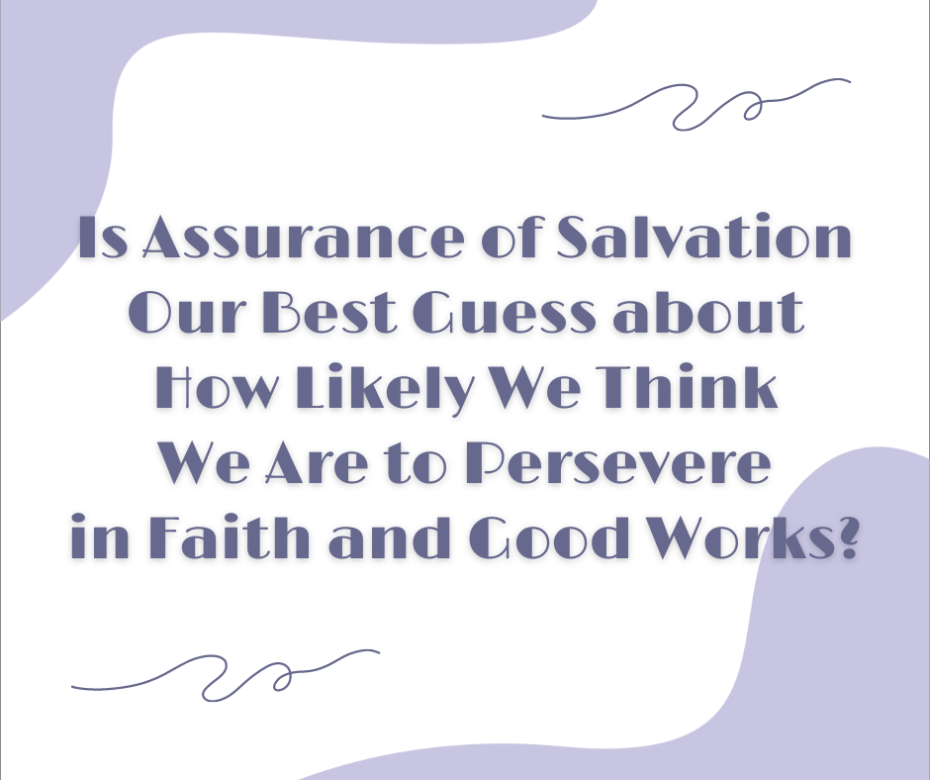Introduction
The Evangelical world today is quite diverse on many issues, including the doctrine of salvation. There is much confusion about what a person must do to be saved. Pastors and theologians are not always theological safe spaces. Though well intentioned, they mislead many on a number of fundamental truths.
There are many such issues. I’ve restricted myself to five current issues in salvation.
The first issue is what we mean by the expression assurance of salvation.
Many schools and many pastors today teach that Biblical assurance of salvation is not certainty, but instead varying degrees of confidence. Depending on how well you are doing in your Christian life, your level of confidence may vary from 10% to 99%.
Back in 1991, I debated a then DTS seminary professor, Ken, on saving faith and assurance. During the course of the debate, I asked him if he was certain that he had everlasting life. He said he was 99% sure. I brought up that the apostles were sure, since Jesus guaranteed that they will sit on twelve thrones and rule over the twelve tribes of Israel (Matt 19:28). So were Euodia and Syntyche and Clement, since Paul said that their names are in the Book of Life (Phil 4:3). Why could they be sure, but we can’t? His answer is that we can’t be sure because our names do not appear in the Bible!
Since most professing Christians today believe that only those who persevere in faith and good works will make it into the kingdom, they think that assurance of salvation is only your best guess about how likely you are to persevere in faith and good works until the day you die.
The problems with this view are that Biblical assurance is certainty and that assurance is found in the promises of God, not in our works (John 11:25-27; 1 John 5:9-13).
At the Desiring God website, in an article entitled, “Helping People Have the Assurance of Salvation,” Dr. John Piper says that assurance requires “the painful work of self-examination” and that “assurance is a fight until the day we die” (see here).
Calvinist David Engelsma recognizes that what Piper says is a problem for many Calvinists today who follow in the tradition of the Puritans:
These Puritans taught that assurance is, and should be, a real problem for many, if not most, believers and children of believers. It is normal to lack assurance; normal to wonder whether one is really saved; normal to struggle with the question of assurance; normal that one’s relation to assurance is that of a “quest,” a long, even lifelong, “quest,” with no assurance of a favorable outcome of the quest, namely, finding assurance in this life; and, therefore, also, normal to abstain from the sacrament of the Lord’s Supper (The Gift of Assurance, p. 9).
Calvinist John MacArthur has a message at the Grace to You website entitled, “Resting in the Assurance of Salvation.” He says that assurance is found in the objective promises in the Bible and in our subjective works. He says that after we determine whether we “believe that which is necessary to save” (which he does not explain), then “you ask, ‘What is going on in my life? Am I seeing a transformation in my life?’ because that’s essential, that’s essential” (see here).
When the Lord asked Martha, “Do you believe this?” (John 11:26b), He expected an affirmative answer. And Martha gave that: “Yes, Lord, I believe that You are the Christ, the Son of God, who is to come into the world” (John 11:27). He did not rebuke her for her answer. In fact, He made sure that it became part of the only evangelistic book in the Bible. Assurance is certainty since it is purely based on the objective promise of everlasting life. It is not at all based on introspection.
It is not arrogant to tell people that you are certain you have everlasting life that can never be lost. Why? We are certain, not because of our works or our best guess as to whether we will persevere or not. Our assurance is based solely on the Word of the One who is the Way, the Truth, and the Life! His Word is sure.
Introspection kills assurance. Looking to Jesus is the only way to have assurance of salvation, that is, certainty of your eternal destiny.
Do you believe this?


